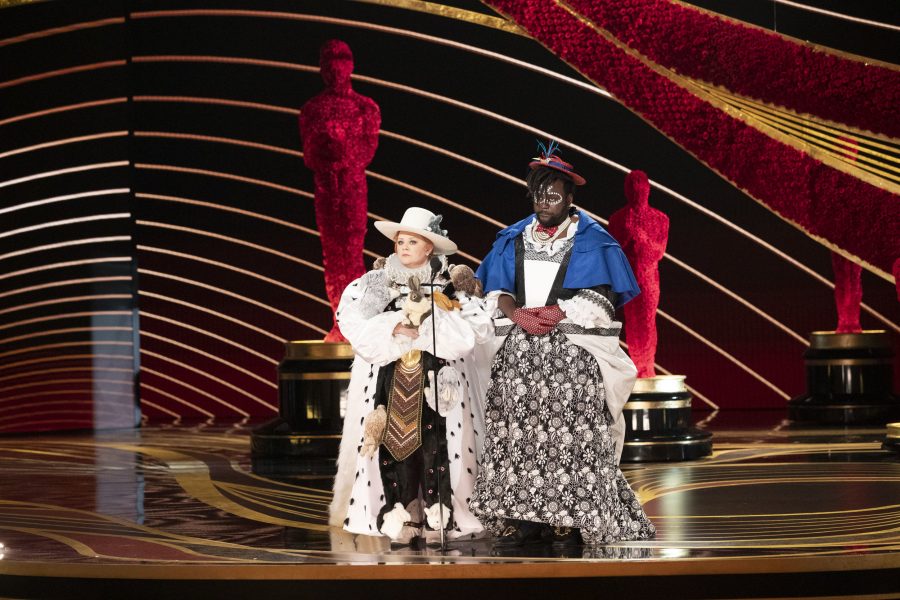Academy’s 91st Oscars ceremony incites even more backlash
ABC | Craig Sjodin
March 5, 2019
The Oscars have not had a positive reputation in several years. From the creation of the #OscarsSoWhite campaign highlighting the lack of diversity among nominees for the prestigious film awards to the infamous 2017 blemish of La La Land and Moonlight being confused for best picture, the Academy of Motion Picture Arts and Sciences was in a position to work on its awards ceremony’s semitarnished reputation.
The 91st annual Oscars flexed impressive improvements, increased ratings and fair wins with the excepted snubs and faults that litter through every award show.
The mostly neutral night wasn’t set out to be uncontroversial. The Academy originally announced a plan to air four technical art awards — cinematography, makeup and hairstyling, film editing and live-action short — during commercial breaks to ensure a streamlined and shortened telecast. A heavy backlash from industry workers and fans quickly prompted a reworking to fit the categories into the televised event.
The Academy’s disregard for the technical arts worried viewers, as did other persistent issues with the Oscars, like the notorious role of the host. Kevin Hart stepped down from his announced hosting gig after the comedian’s past homophobic tweets upset the public, leaving a void in the awards show.
Instead of grappling for any another available comedian, the Academy took an unprecedented move to have no host at all and it was for the better.
A stream of Hollywood favorites assumed the role of host of the night, each taking their own moment to obtain laughs and jabs. Hollywood’s comedic first ladies Tina Fey, Amy Poehler and Maya Rudolph, opened the show with their seasoned charisma and playful remarks toward President Donald Trump.
“Just a quick update for everybody, in case you’re confused: There is no host tonight, there won’t be a popular movie category and Mexico is not paying for the wall,” reminded Rudolph.
Melissa McCarthy, who was nominated for her oddly fitting role in Can You Ever Forgive Me?, teamed up with Brian Tyree Henry and a star-in-the-making bunny puppet to announce the award for best costume design. Draped in a collage of costumes from the category’s nominees this year, the two instantly created an iconic moment of the night.
Aside from the decision that the best host is no host, the Academy also satisfied many with its choices for winners. The moving Netflix movie Roma took home best foreign language film and best director.
Regina King won best supporting actress for her performance in If Beale Street Could Talk. BlacKkKlansman won best adapted screenplay, prompting director Spike Lee to leap with joy onto the stage.
Best actress went to Olivia Colman in The Favourite, who admitted that she was surprised to win. “Glenn Close, you’ve been my idol for so long and this not how I wanted it to be,” said the tearful winner to Close, the seven-time nominated veteran actress who lost again despite her acclaimed role in The Wife.
Disney and Pixar witnessed a loss as well, seeing their combined six-year streak for best animated feature end to Spider-Man: Into the Spider-Verse. With two nominees, Ralph Breaks the Internet and Incredibles 2, the animated powerhouse of Disney couldn’t stand up to Sony’s innovative take on the classic superhero.
Lady Gaga and Bradley Cooper became the highly popular — yet fictional — power couple of the night with their performance of “Shallow.” The track from A Star is Born differed greatly from Gaga’s solo performance of the song on the Grammys a few weeks ago. Opting for the simple background of a piano, guitar and Cooper’s vocals during the majority of the song, Gaga dissolved out of reality to rehash her character, Ally, and the emotional power of the movie.
Gaga’s moment lasted beyond her performance; the three-time nominee — previously nominated for best original song in 2016 and who was concurrently nominated for best actress — won best original song alongside co-songwriters Mark Ronson, Anthony Rossomando and Andrew Wyatt.
Amid these smart choices for the Academy, the one communally deemed slip-up came from the biggest award of the night, best picture, the coveted title that went to Green Book.
The highly esteemed category held many acclaimed titles such as Black Panther and Roma, but director-writer Peter Farrelly’s display of racial tensions in the era of segregation won over the Academy’s vote.
The immediate spark of backlash burned over on social media, but also within the Dolby Theatre; BlacKkKlansman director Spike Lee tried to leave early, stating later, “The ref made a bad call.”
This year’s moderately positive show isn’t necessarily ushering in a golden era of the Oscars, but the tactful planning and accomplished presentation beckon for further and greater shows and winners.







